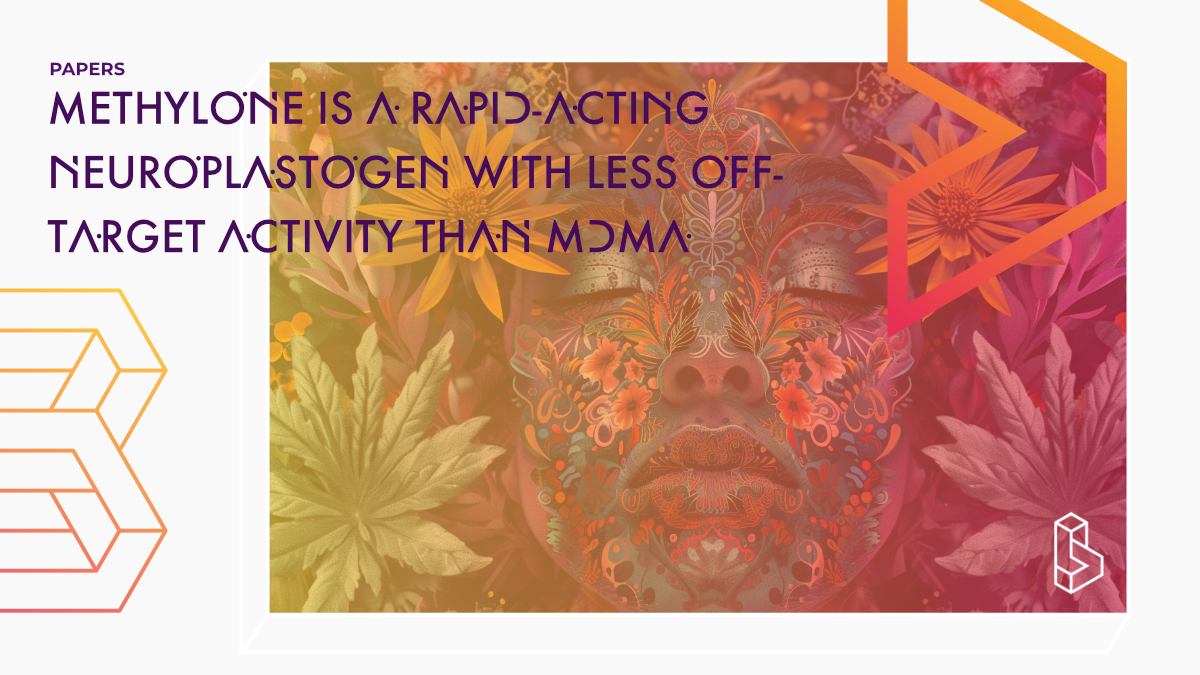This preclinical study (in cells) investigated methylone’s potential for treating PTSD, comparing it with MDMA. Methylone showed rapid antidepressant and anxiolytic effects in preclinical models, affecting gene expression related to neuroplasticity in brain areas associated with PTSD and MDD. Unlike MDMA, methylone demonstrated no off-target effects at various receptors, indicating potential higher specificity, and suggesting its potential use in treating PTSD and other neuropsychiatric disorders.
Abstract of Methylone is a rapid-acting neuroplastogen with less off-target activity than MDMA
“Background: Post-traumatic stress disorder (PTSD) is a highly prevalent psychiatric disorder that can become chronic and debilitating when left untreated. Available pharmacotherapies are limited, take weeks to show modest benefit and remain ineffective for up to 40% of patients. Methylone is currently in clinical development for the treatment of PTSD. Preclinical studies show rapid, robust and long-lasting antidepressant-like and anxiolytic effects. The mechanism of action underlying these effects is not yet fully understood. This study investigated the downstream gene expression changes and signaling pathways affected by methylone in key brain areas linked to PTSD and MDD. It also sought to determine whether neuroplasticity-related genes were involved. We compared effects of methylone with MDMA to explore similarities and differences in their brain effects because MDMA-assisted psychotherapy has recently shown benefit in clinical trials for PTSD and methylone is a structural analog of MDMA.
Methods: Monoamine binding, uptake and release studies were performed and a high-throughput-screen evaluated agonist/antagonist activities at 168 GPCRs in vitro. We used RNA sequencing (RNA-seq) to probe drug-induced gene expression changes in the amygdala and frontal cortex, two brain areas responsible for emotional learning that are affected by PTSD and MDD. Rats were treated with methylone or MDMA (both 10 mg/kg, IP), and their responses were compared with controls. We performed functional enrichment analysis to identify which pathways were regulated by methylone and/or MDMA. We confirmed changes in gene expression using immunohistochemistry.
Results: Methylone, a monoamine uptake inhibitor and releaser, demonstrated no off-target effects at 168 GPCRs, unlike MDMA, which showed activity at 5HT2A and 5HT2C receptors. RNA-seq results revealed significant regulation of myelin-related genes in the amygdala, confirmed by immunohistochemistry. In the frontal cortex, methylone significantly upregulated genes implicated in neuroplasticity.
Conclusion: Results suggest that (1) methylone is a rapid-acting neuroplastogen that affects key brain substrates for PTSD and MDD and that (2) methylone appears to exhibit higher specificity and fewer off-target effects than MDMA. Together, these results are consistent with the reported clinical experiences of methylone and MDMA and bolster the potential use of methylone in the treatment of PTSD and, potentially, other neuropsychiatric disorders.”
Authors: Jennifer Warner-Schmidt, Martin Stogniew, Blake Mandell, R. Scott Rowland, Eric F. Schmidt & Benjamin Kelmendi
Summary of Methylone is a rapid-acting neuroplastogen with less off-target activity than MDMA
Introduction
Post-traumatic stress disorder (PTSD) is a debilitating disorder characterized by intrusive flashbacks of a traumatic event, heightened arousal, mood changes, and a high rate of comorbidity with other CNS disorders, including major depression (MDD).
MDMA-assisted psychotherapy has shown potential for alleviating PTSD symptoms, but requires extensive concomitant psychotherapy and integrations sessions. Methylone, a structural analog of MDMA, has emerged as a promising new treatment for PTSD, but requires less specialized concomitant psychotherapy and the potential for coadministration with SSRIs.
Find this paper
Methylone is a rapid-acting neuroplastogen with less off-target activity than MDMA
https://doi.org/10.3389/fnins.2024.1353131
Open Access | Google Scholar | Backup | 🕊
Cite this paper (APA)
Warner-Schmidt, J., Stogniew, M., Mandell, B., Rowland, R. S., Schmidt, E. F., & Kelmendi, B. Methylone is a rapid-acting neuroplastogen with less off-target activity than MDMA. Frontiers in Neuroscience, 18, 1353131.
Linked Research Papers
Notable research papers that build on or are influenced by this paper
Methylone, a rapid acting entactogen with robust anxiolytic and antidepressant-like activityThis rat study finds that methylone (5-3-mg/kg) showed a reduction of 95% in immobility in the forced swim test (FST), a measure of antidepressant effects commonly used in mice studies. Methylone is similar to MDMA but shows less activity in the serotonin system. Pretreatment with an antidepressant (fluoxetine) didn't change the effects, indicating they may be co-administrated.

